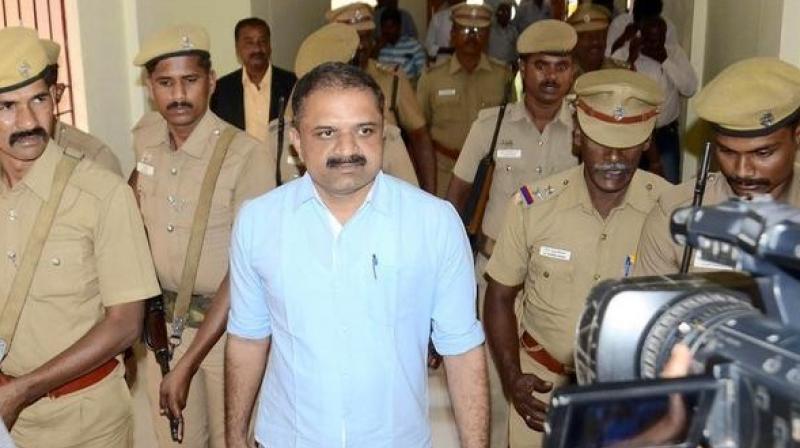New Delhi: The Supreme Court Friday extended by one week the parole of AG Perarivalan, serving life term in Rajiv Gandhi assassination case, for medical treatment.
A bench of Justices L Nageswara Rao and S Ravindra Bhat said the court had extended the parole by a week on November 23 and directed the state to provide escort to Perarivalan.
It said that an interlocutory application has been filed by the petitioner seeking extension of parole by 90 days because of ailment and need for surgical intervention.
The top court said that in view of the submissions of senior advocate Gopal Shankarnarayanan, appearing for the petitioner and advocate Balaji Srinivasan, representing Tamil Nadu, Perarivalan’s parole is extended by one week from Friday.
The bench clarified that it will be the last extension of parole and directed the state to provide police escort to Perarivalan for visiting the doctor.
Perarivalan was first granted parole from November 9 to November 23 by the Madras High Court on medical grounds, which was extended by the top court.
At the outset, Shankarnarayanan said that Perarivalan has 25 per cent blockage in kidney and needs surgical intervention.
To this the bench told Shankarnarayanan that he is seeking extension of parole by 90 days but the senior counsel replied that they should not have asked for three months extension.
The bench said that why doesn’t the petitioner ask the government as it is the state which has also recommended his release.
Shankarnarayanan said that it might not be proper as the last extension of parole was granted by this court.
Srinivasan pointed out to the court that as per relevant rules Perarivalan is entitled to 30 days parole every two years but till now he has already availed of 51 days over and above his entitlement.
He submitted that Perarivalain wants to go to a hospital which is 200 Km away and not to the CMC Vellore, which is only 25 km away from his house.
Referring to the order passed by the High Court on November 6, Srinivasan said that while granting an extension of 14 days it has specifically observed that no further extension will be granted.
He said that the hospital in which Perarivalan is seeking treatment also has a “background”.
The bench warned the counsel for petitioner that he should not resort to his sharp practices and his counsels should take care of it.
November 23, the top court had directed the Tamil Nadu government to provide police escort to Perarivalan during his visit to the hospital.
The CBI, in its affidavit of November 20, has told the apex court that the Tamil Nadu Governor has to take a call on grant of remission to Perarivalan.
The CBI said Perarivalan is not the subject matter of further investigation carried out by the CBI-led Multi-Disciplinary Monitoring Agency (MDMA) which is conducting a probe on the aspect of “larger conspiracy” as per the mandate of the Jain Commission report.
The top court is hearing the plea of 46-year-old Perarivalan seeking suspension of his life sentence in the case till the MDMA probe is completed.
November 3, the top court had expressed unhappiness over the pendency of a plea by a convict seeking pardon in the case for over two years with the Tamil Nadu Governor.
The CBI, in its 24-page affidavit, said, “It is for the His Excellency Governor of Tamil Nadu to take a call on the issue whether remission is to be granted or not and in so far as relief is concerned in the present matter CBI has no role”.
The state government had earlier told the top court that the Cabinet has already passed a resolution on September 9, 2018 and recommended to the Governor for the premature release of all seven convicts in the case.
Perarivalan’s counsel had earlier said his role was only limited to procuring nine-volt batteries, which were allegedly used in the improvised explosive device (IED) that had killed Gandhi.
The top court had earlier dismissed a plea of Perarivalan seeking recall of the May 11, 1999 verdict upholding his conviction, saying the material brought on record does not inspire confidence to interfere with the verdict in which he and three others were initially awarded the death sentence, later commuted to life term.
Gandhi was assassinated on the night of May 21, 1991 at Sriperumbudur in Tamil Nadu by a woman suicide bomber, identified as Dhanu, at a poll rally. Fourteen others, including Dhanu herself, were also killed.
Gandhi’s assassination was perhaps the first case of suicide bombing which had claimed the life of a high-profile leader. In its May 1999 order, the top court had upheld the death sentence of four convicts — Perarivalan, Murugan, Santham and Nalini.
In April 2000, the Tamil Nadu Governor had commuted the death sentence of Nalini on the basis of the state government’s recommendation and an appeal by former Congress president and Rajiv Gandhi’s widow Sonia Gandhi.
February 18, 2014, the top court had commuted the death sentence of Perarivalan to life imprisonment, along with that of two other prisoners — Santhan and Murugan — on the grounds of an 11-year delay in deciding their mercy pleas by the Centre.
PTI
